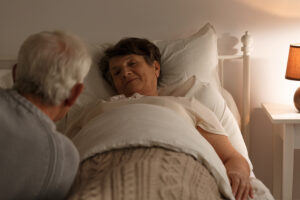What Causes Sundowning?
Sundowning is a temporary worsening of symptoms in people with dementia and Alzheimer’s disease. Your elderly family member may not notice exactly what happens during this time, but you’ll be much more aware of your senior’s symptoms. Understanding sundowning might help you to put solutions in place that help your senior to cope with it more readily.
Lower Levels of Natural Light

Elder Care Memorial, TX: Sundowning and Seniors
The name of this condition, sundowning, might point to one of the possible causes. As natural light diminishes, the world around your senior changes a bit. Things look different and that can be confusing. If your senior already has trouble with her vision, lower levels of natural light may be even more triggering for her.
Fatigue at the End of the Day
Getting through the day takes a lot of energy for anyone, but your senior may be more exhausted than she realizes at the end of the day. This might mean that her brain just can’t keep up with the information it’s bringing in by the time that she’s that fatigued. From there, she’s confused and frustrated and may be acting out.
End-of-Day Activity
Depending on your senior’s living situation, there may be quite a bit of activity around the late afternoon and early evening hours. People coming and going, dinner getting prepared, and other activities all happening at once can be overwhelming and lead to sundowning confusion. Sticking to regular routines that help to calm all of that down can sometimes help.
Circadian Rhythm or Hormonal Imbalances
There may be some internal contributing factors, too. Scientists aren’t sure how hormones play into sundowning, but it’s possible that they do. If your senior’s sleep schedule is off, that can throw off her circadian rhythm. Having irregular waking and sleep patterns can exacerbate issues with sundowning. Getting into a regular schedule with set wake-up and sleep times may help to get your senior back on track and might help to reduce some of her difficulty with sundowning.
Time of Year May Play a Role
Fall and winter mean longer nights and shorter days. That often means that sunset comes a lot earlier than your senior expects, which can also make sundowning worse for her. There may be other factors, too, like seasonal affective disorder, that make sundowning more complicated in winter and fall months.
Sundowning can be complicated to manage, especially on your own. Working with elder care providers can make this time of day a little bit easier on both you and your elderly family member.
If you or an aging loved one are considering Elder Care in Memorial, TX, contact the caring staff at Personal Caregiving Services at 832-564-0338. Providing Care in Houston, Bellaire, West University Place, Katy, and Sugar Land and the surrounding areas.
- Why Maintaining Flexibility Is So Important For Seniors - April 3, 2025
- Home Care Assistance Helps Seniors Manage Medical Appointments - March 19, 2025
- Symptoms and Causes of Edema in the Legs and Feet - March 5, 2025
